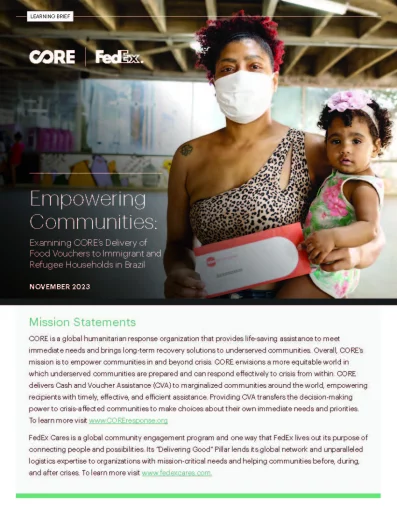Empowering Communities: Examining CORE’s Delivery of Food Vouchers to Immigrant and Refugee Households in Brazil
In 2022 alone Brazil hosted more than 560,000 refugees, asylum-seekers, stateless individuals and other individuals needing international protection. With year-on-year increase this trend is likely to continue. Although the government of Brazil does extend several protections to refugees—including documents, work, and study—the needs significantly outweigh the government’s capacity for adequate response. Many refugees, asylees, and stateless persons are unable to access social assistance in a timely manner, or altogether, due to language barriers and/or lack of information and case management support.
To address these needs, CORE utilized internal funding to launch CRAI Rio (Centro de Referência e Atendimento para Imigrantes), CORE’s Care Center for Immigrant Refugees and Stateless Persons in early 2023 in partnership with the Special Secretariat for Citizenship (SECID), International Organization for Migration (IOM), and the United Nations High Commissioner for Refugees (UNHCR). CORE developed CRAI Rio with the intention of running its services, activities, and operations for six months, then transitioning the center over to SECID for long-term management.
The first facility of its kind in the city, CRAI Rio supports recently arrived immigrants, refugees, and stateless persons with a myriad of services, including temporary shelter for individuals and families, legal assistance, social assistance, psychosocial support, vouchers for food assistance, Uber rides to support clients’ transportation to reach referred partners, digital inclusion activities and Portuguese language classes. The population served included individuals who self-identified as male, female, and transgender. Nations of origin included Venezuela, Angola, Colombia, Congo, Peru, Haiti, Argentina, and Syria.
This learning brief focuses specifically on lessons pertaining to CORE’s voucher assistance delivered to migrants who sought services from CRAI Rio. It includes recommendations for scaling cash and/or voucher assistance within a resource hub model, including to enhance complementarity between cash and/or voucher assistance and other types of services.



